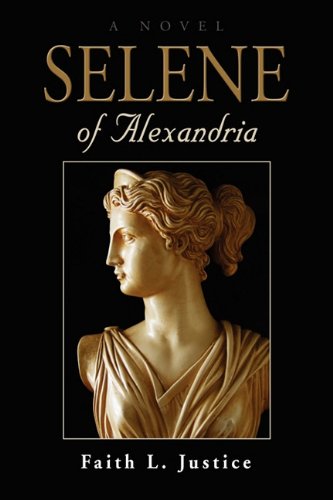It's Tuesday, so that means it's time for a great guest post! Today's guest blogger is Faith Justice, author of
Selene of Alexandria. Today Faith is going to share with us why her novel is set in the 5th century. So let me introduce Faith Justice.
 Tudor Women Move Over: the Theodosians Are Here!
Tudor Women Move Over: the Theodosians Are Here!
Why do some historical fiction writers specialize in the Tudors, or World War II, or medieval Japan? Why did I choose to delve into the 5th Century AD? After all, if you put a timeline on the wall and throw a dart, it would make no difference what year you hit—people somewhere would be creating art and culture, innovating in crafts and science, warring over territory and religion, fighting diseases and natural disasters. Down through the ages individuals love one another, give birth, and betray each other; work, fight, and die—the stuff of fiction (historical or otherwise).
Like a lot of history geeks, I read about many time periods. I went through an ancient Greek/Roman/Egyptian phase, American Revolution/Civil War/Expansionist phase, and—yes—a Tudor phase. I was drawn to stories of strong women: Sappho the poet, Hatshepsut the Pharaoh, Boudica of the Iceni, Eleanor of Aquitaine, and all those Tudor women. Many of whom were immortalized in Judy Chicago's ground-breaking feminist art exhibit "The Dinner Party" which I attended in 1980. So I was surprised when I ran across a woman whose story I didn't know there—Hypatia, the Lady Philosopher of Alexandria. The accompanying Dinner Party catalog described Hypatia as "a Roman scholar and philosopher who lived in Alexandria...she stressed the importance of goddesses and the feminine aspects of culture" and made much of the fact that she was murdered by a Christian mob in 415.
I was hooked—caught up in the romanticism and inherent drama of Hypatia's life. I embarked on a journey to learn as much as I could about this fascinating woman and the times she lived in. The 5th Century was particularly turbulent: the Huns forced other barbarian tribes west into Roman territory, the Catholic Church underwent violent birth pangs as it emerged from a century of internal conflict to become a potent political force, and the power that was Rome stumbled, mortally wounded. This was the century of the Fall of Rome (in the West)—what was not to like?
As I researched Hypatia's story, I came across other remarkable (and little known) women and their stories: Galla Placidia, sister to Emperor Honorius who was captured by the Goths when they took Rome in 410, married their king and ruled the Western Empire for over twenty years; her niece Pulcheria who proclaimed herself Regent for her younger brother Theodosius II at the tender age of fifteen and co-ruled with him for much of his reign; Athenais, a young beauty who captured the heart of Theodosius and contended with Pulcheria for influence over the Emperor—all wonderfully complex, compelling stories set in this time of turbulence and change.
I wrote Hypatia's story in Selene of Alexandria (2009), Galla Placidia's in Twilight Empress (due out in 2010/11), and I am writing about Pulcheria and Athenais in my current work. I'm hoping readers are becoming just a little bored with the Tudor women and their era. Maybe they're ready for something different, but equally fascinating: the Theodosian women and the Fall of Rome. We'll see.
Faith L. Justice is a history junkie and science geek who lives and writes in her land marked home "The Suffragette House" in Brooklyn, New York. You can read sample chapters of Selene of Alexandria and Twilight Empress at Faith's website
www.faithljustice.com or check out her blog Historian's Notebook for history in the news, interviews with historical fiction writers, reviews, and essays about all things historical.
Faith, thank you for that. I can see why you have chosen these strong women, and the time period they lived in. It truly was a great period, and the stories that have come from then are so full of everything that makes a story great.
I love to learn why authors write about their subjects, what draws them to the stories they write, and where their interest in these subjects comes from. It makes me feel more connected to the story if I understand what the author's reasoning is. I'm really looking forward to reading SELENE of Alexandria now. I think it's going to have to bump the two book that are ahead of it :-)
So again, thank you so much for sharing with us. I hope that you will join us again in the near future.
-Jennifer


